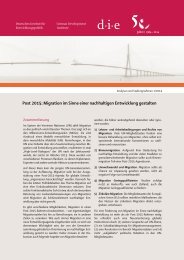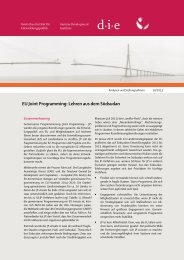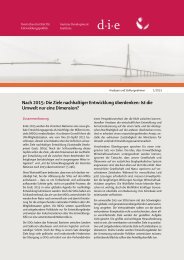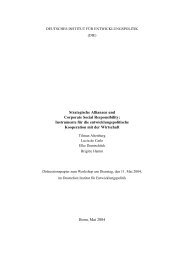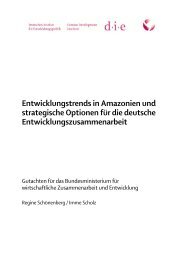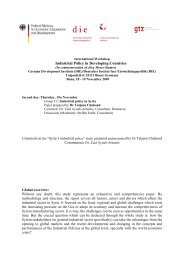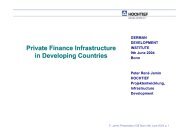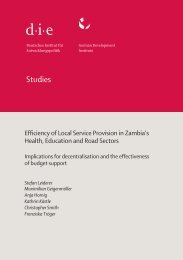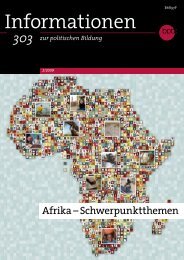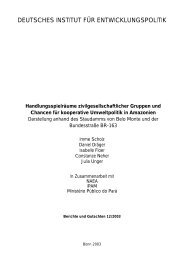Middle East / North Africa and the Millennium Development Goals ...
Middle East / North Africa and the Millennium Development Goals ...
Middle East / North Africa and the Millennium Development Goals ...
You also want an ePaper? Increase the reach of your titles
YUMPU automatically turns print PDFs into web optimized ePapers that Google loves.
Markus Loewe<br />
Four countries in <strong>the</strong> MENA region are faced with an especially urgency<br />
to solve <strong>the</strong>ir socioeconomic problems: Yemen, Sudan, Mauritania, <strong>and</strong><br />
Iraq. Chapter 3 has already pointed out that since 1990 <strong>the</strong>se four countries<br />
have made very little progress in implementing <strong>the</strong> MDGs: On <strong>the</strong> one<br />
h<strong>and</strong>, <strong>the</strong>ir values on <strong>the</strong> MDG indicators have not improved much in relation<br />
to <strong>the</strong>ir initial levels. On <strong>the</strong> o<strong>the</strong>r h<strong>and</strong>, <strong>the</strong> absolute values for <strong>the</strong>se<br />
countries are also very low. On some MDGs, <strong>the</strong> situation is somewhat<br />
similar in Egypt, Algeria, Iran, Jordan, Morocco, <strong>the</strong> Palestinian Territories,<br />
<strong>and</strong> Syria,– though nowhere near to <strong>the</strong> same extent as in <strong>the</strong> three<br />
countries named above.<br />
Yemen, Sudan, Mauritania, <strong>the</strong> Palestinian Territories <strong>and</strong> Iraq have very<br />
low capacities in solving problems, as well. Yemen, Sudan, <strong>and</strong> Mauritania<br />
lack, first of all, <strong>the</strong> financial resources needed both to implement<br />
measures geared to implementing <strong>the</strong> MDGs <strong>and</strong> to acquire <strong>the</strong> expertise<br />
required for <strong>the</strong> purpose. In <strong>the</strong> Palestinian Territories <strong>and</strong> Iraq, however,<br />
<strong>the</strong> main bottleneck is not a lack of financial means. Instead, <strong>the</strong> scopes of<br />
<strong>the</strong>se two countries are restricted by political givens: (i) <strong>the</strong> Israeli occupation<br />
<strong>and</strong> <strong>the</strong> uncertain legal status of <strong>the</strong> Palestinian Authority in <strong>the</strong> case<br />
of <strong>the</strong> Palestinian Territories; (ii) <strong>and</strong> <strong>the</strong> continuing presence of US troops<br />
<strong>the</strong>re <strong>and</strong> <strong>the</strong> country’s security situation in <strong>the</strong> case of Iraq.<br />
Chapter 4 was unable to fully answer <strong>the</strong> question whe<strong>the</strong>r <strong>and</strong> to what extent<br />
<strong>the</strong> rulers in <strong>the</strong> MENA region are disposed to effectively solve <strong>the</strong><br />
problems of <strong>the</strong>ir countries. We can, however, assume that most of <strong>the</strong>m<br />
have no interest whatever in implementing all of <strong>the</strong> MDGs. This goes,<br />
above all, for <strong>the</strong> issue of good governance (an aspect of MDG8), but in<br />
part also for MDG1 (eradication of extreme poverty <strong>and</strong> hunger), MDG3<br />
(gender equality), MDG7 (environmental sustainability), <strong>and</strong> MDG3 (improved<br />
school education).<br />
Therefore, we limit ourselves at large to assessing <strong>the</strong> urgency <strong>and</strong> capacities<br />
within <strong>the</strong> different MENA countries to solve <strong>the</strong>ir socioeconomic<br />
problems when we analyze in what follows <strong>the</strong> country programming of<br />
German DC with <strong>the</strong> MENA region.<br />
Within <strong>the</strong> MENA region, Germany cooperates mainly with four priority<br />
partner countries (Egypt, Yemen, Morocco, <strong>and</strong> <strong>the</strong> Palestinian Territories)<br />
<strong>and</strong> – to a lesser extent – with five partner countries (Algeria, Jordan,<br />
124 German <strong>Development</strong> Institute



